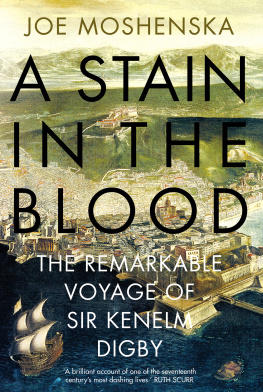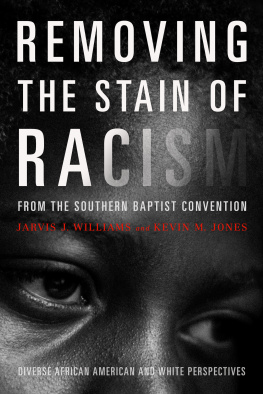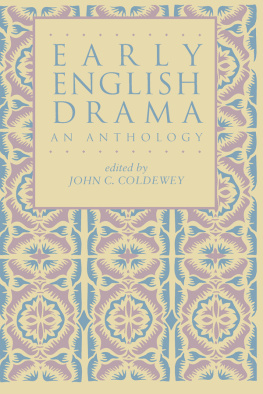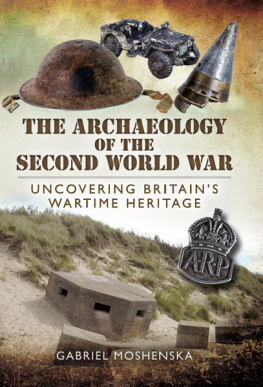Joe Moshenska - A Stain in the Blood: The Remarkable Voyage of Sir Kenelm Digby
Here you can read online Joe Moshenska - A Stain in the Blood: The Remarkable Voyage of Sir Kenelm Digby full text of the book (entire story) in english for free. Download pdf and epub, get meaning, cover and reviews about this ebook. year: 2016, publisher: Penguin Random House UK, genre: Politics. Description of the work, (preface) as well as reviews are available. Best literature library LitArk.com created for fans of good reading and offers a wide selection of genres:
Romance novel
Science fiction
Adventure
Detective
Science
History
Home and family
Prose
Art
Politics
Computer
Non-fiction
Religion
Business
Children
Humor
Choose a favorite category and find really read worthwhile books. Enjoy immersion in the world of imagination, feel the emotions of the characters or learn something new for yourself, make an fascinating discovery.
- Book:A Stain in the Blood: The Remarkable Voyage of Sir Kenelm Digby
- Author:
- Publisher:Penguin Random House UK
- Genre:
- Year:2016
- Rating:5 / 5
- Favourites:Add to favourites
- Your mark:
- 100
- 1
- 2
- 3
- 4
- 5
A Stain in the Blood: The Remarkable Voyage of Sir Kenelm Digby: summary, description and annotation
We offer to read an annotation, description, summary or preface (depends on what the author of the book "A Stain in the Blood: The Remarkable Voyage of Sir Kenelm Digby" wrote himself). If you haven't found the necessary information about the book — write in the comments, we will try to find it.
A Stain in the Blood: The Remarkable Voyage of Sir Kenelm Digby — read online for free the complete book (whole text) full work
Below is the text of the book, divided by pages. System saving the place of the last page read, allows you to conveniently read the book "A Stain in the Blood: The Remarkable Voyage of Sir Kenelm Digby" online for free, without having to search again every time where you left off. Put a bookmark, and you can go to the page where you finished reading at any time.
Font size:
Interval:
Bookmark:
Joe Moshenska spent parts of his childhood in France and Zimbabwe, and was educated at Sidney Sussex College, Cambridge, and at Princeton University, where he received his PhD. He is now a Fellow and Lecturer in English at Trinity College, Cambridge. In 2015 he was chosen as a BBC New Generation Thinker.
On the 16th of August 1628, five battle-scarred English ships sailed into the harbour of the Greek island of Milos. Dropping anchor, the 25-year-old captain banqueted with the local lord before sitting down to write an account of his journey an account that would transform him entirely.
Sir Kenelm Digby was known as one of the most remarkable Englishmen who ever lived: a trusted advisor to the King, but the sworn enemy of the all-powerful Duke of Buckingham; a pioneering philosopher and scientist, but committed to the occult arts of alchemy and astrology; a friend not only of Ben Jonson, Thomas Hobbes and van Dyck, but even Oliver Cromwell. He was also widely known as the son of a traytor and husband of a whore: a man who witnessed his fathers gruesome execution for high treason as a Gunpowder Plotter, and the lover of the most celebrated beauty of the age, Venetia Stanley.
In an attempt to clear his name, and on a quest for personal glory, Digby assembled a fleet and set sail for the Mediterranean: a world of pirate cities and ancient ruins where people, ideas and exotic goods moved freely between languages and nations. His journey encompassing fevers, mutiny, piracy, daring rescues and heroic sea battles is a great and terribly overlooked adventure, and a prism through which to view England, and all of Europe, during one of the most pivotal periods in its history.
A Stain in the Blood is the story of an extraordinary life, and of a journey that helped to shape a nation. It is a revelatory first work of non-fiction by one of the brightest young writers and thinkers of today.
The years that I have spent getting to know Kenelm Digby have been a joy and a challenge in their own right, but they have also been the most delightful of pretexts: they have given me an excuse to travel to many of the wonderful places that Kenelm visited or in which documents relating to his life have ended up, and to speak with many fascinating people who have generously shared their expertise relating to his diverse areas of interest.
For making materials available and sharing expertise I would like to thank the staff of the British Library, Cambridge University Library, the Bodleian Library, several branches of the Bibliothque Nationale de France, the Vatican Library, the National Library of Wales, the National Archives at Kew, the New York Public Library, the Huntington Library, the Houghton Library at Harvard, the Beinecke Library at Yale, the Biblioteca dellAccademia Nazionale dei Lincei e Corsiniana (especially Allessandro Romanello), the Bibliothque Saint Genvive, the library of the Royal Society, the Derbyshire Record Office, the Somerset Record Office, the Kent History and Library Centre, the library of the Wellcome Trust, Lambeth Palace Library, the library of the Society of Antiquaries, the Archives of the Archdiocese of Westminster, the Pepys Library of Magdalene College, Cambridge, the library of Worcester College, Oxford, the library of St Johns College, Oxford, the library of Wellesley College, the staff of the Mortimer Rare Books Room at Smith College (especially Barbara Blumenthal), Kate Harris at Longleat House, and Ann Smith at Sherborne Castle, who shared with me her unparalleled knowledge of the various branches of the Digby family and their histories. I would particularly like to thank Sandy Paul and the expert staff of the Wren Library and the Trinity College Library.
I owe an enormous debt of gratitude to those friends, colleagues and scholars who have shared knowledge of and enthusiasm for Kenelm and his world: Claire Preston, Kevin Jackson (with whom I still hope to cook some Digby dinners), Jeff Dolven, Reid Barbour, Alan Stewart, Dan Carey, Molly Greene, Michael Hunter, Rhodri Lewis, Nick McDowell, Katie Murphy, Scott Mandelbrote, Gavin Alexander, Steve Connor, Simon Goldhill, Leah Whittington, Antonio Clericuzio, Andrew Zurcher, Lauren Kassell and Nicholas Rodger (who helpfully confirmed that cannons firing with black powder easily could shatter glass and pigeon eggs on a far-off shoreline). Anne-Laure Meyer knows Digbys surviving traces better than anyone, and has been unfailingly generous with her knowledge. I would particularly like to thank Sir Noel Malcolm, for his encouragement and frequent provision of possible leads and intriguing titbits. Nigel Smith remains my principal inspiration for exploring a seventeenth century rarely found in textbooks, and a valued teacher and friend.
The depressing and increasing corporatisation of the English universities has made me ever more aware of my privilege in being able to research and write this book in the surrounds of Trinity College, Cambridge, a place where ideas are still valued for their own sake. I would like to thank the Master, Fellows and staff of the college for helping to make it so. To have had such splendid colleagues in English the late Anne Barton, Angela Leighton, Adrian Poole, Anne Stillman, Anne Toner, and Ross Wilson makes me luckier still. I am indebted as well to my students, often first sounding-boards for undeveloped ideas, and especially those who have tolerated idiosyncratic reading lists and even found themselves writing literature essays on Digbys cookbook. My colleagues in the early modern period could have been deliberately assembled as a crack team designed to advise on Kenelms many facets, and I am grateful to the vast knowledge and good humour of Nick Hardy, Sachiko Kusukawa, Dmitri Levitin, David McKitterick, Richard Serjeantson, and Alex Walsham.
I would never have studied the literature and culture of the early modern period had it not been for the teaching of Sean McEvoy, who remains a dear friend and inspiration. Life in Cambridge has been enriched, enlivened, and made joyous by the friendship of Leo Mellor, Sophie Read and Edward Wilson-Lee. I have become thoroughly used to running most of my thoughts past David Hillman, with whom I have shared so much in so relatively short a time.
I have been fortunate to have had research assistance at crucial moments from three young scholars at the beginning of their glittering careers: Cassie Gorman, Andrew Sanchez, and Ted Tregear. I have benefited from responses to work in progress from a number of conference and seminar audiences: thanks to all those in Cambridge, Oxford, York, Princeton, London and Galway who asked questions and made comments.
My research has been generously supported at different points by the Vice Chancellors Fund of the University of Cambridge, an Early Career Fellowship from the Centre for Research in the Arts, Social Sciences and Humanities (CRASSH), a small research grant from the British Academy, and, repeatedly, by the Fellows Research Fund of Trinity College. Its completion was aided enormously by a research fellowship from the Leverhulme Trust. I am enormously grateful to all of these bodies. For supporting and encouraging other aspects of my work on Digby I would like to thank Jacqueline Baker, and all those with whom I have worked at the BBC. Some of the material used in this book also forms the basis of my article Kenelm Digbys Interruptions: Piracy and Lived Romance in the 1620s, Studies in Philology, vol. 113 (2016) North Carolina University Press.
I have been tremendously fortunate to have had, in Luke Ingram, someone who was a dear friend for a decade before he became my literary agent. I am grateful to him for constant support and advice, as well as to the entire staff of the Wylie Agency, especially Sarah Chalfant. In Tom Avery I have been blessed with an editor whose enthusiasm for the project was immediate and unwavering, and who has shepherded and shaped it expertly through its development, his comments both exacting and acute. I am hugely thankful to him, and to all the staff at William Heinemann, especially Emma Finnigan, Nicky Nevin, Jason Smith, Anna Watts, and my lynx-eyed copy-editor Mary Chamberlain. Cherrell Avery produced a wonderfully elegant recreation of Digbys monogram at short notice.
Font size:
Interval:
Bookmark:
Similar books «A Stain in the Blood: The Remarkable Voyage of Sir Kenelm Digby»
Look at similar books to A Stain in the Blood: The Remarkable Voyage of Sir Kenelm Digby. We have selected literature similar in name and meaning in the hope of providing readers with more options to find new, interesting, not yet read works.
Discussion, reviews of the book A Stain in the Blood: The Remarkable Voyage of Sir Kenelm Digby and just readers' own opinions. Leave your comments, write what you think about the work, its meaning or the main characters. Specify what exactly you liked and what you didn't like, and why you think so.







